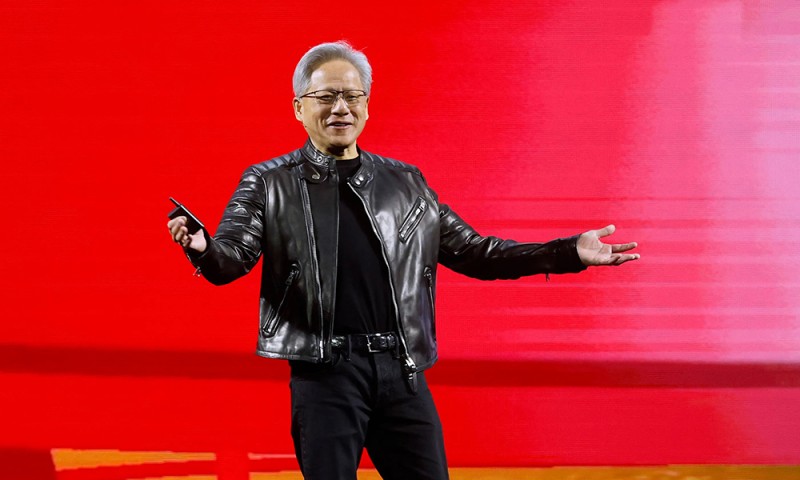
• 因投资者对人工智能企业的增长上限提出质疑,科技股8月应声下跌。英伟达、美满科技(Marvell Technology)及超微电脑公司(Super Micro Computer Inc.)上月表现均逊于大盘。这种不确定性可能影响以“七巨头”科技公司为主的标普500指数。
纳斯达克100指数上周五收盘时下跌1.22%,尽管美国市场周一因劳动节假期休市,但该指数的期货合约交易并未休市:今日上午其交易持平,这意味着投资者对周二纽约股市开盘时科技股的表现并不抱太大期望。
尽管整体标准普尔500指数上涨3.56%,但纳斯达克100指数8月收盘时仍下跌0.16%。
整个八月,科技股的表现始终受限于“人工智能是否处于泡沫期”的讨论。麻省理工学院(MIT)的研究表明,95%的企业尚未从其人工智能投资中获得回报。
正如德意志银行(Deutsche Bank)分析师吉姆·里德(Jim Reid)及其团队近日所言:“英伟达(上周五下跌3.32%)是市场疲软态势的主要推手。其股价下跌的原因在于美满科技的前景展望引发市场对数据中心设备需求的质疑,以及中国阿里巴巴推出新人工智能芯片。上周三,英伟达公布的财报虽略好于预期,但数据中心部门营收增速放缓,部分原因在于对华人工智能芯片销售暂停。”
美满科技总部位于加利福尼亚州圣克拉拉,主营半导体芯片业务。该公司与英伟达建立了合作关系。在8月28日举行的2026财年第二季度财报电话会议上,该公司首席执行官马特·墨菲(Matt Murphy)表示:“我们预计第三季度数据中心整体营收将与上一季度持平。”持平意味着没有增长,这一消息导致美满科技股价次日下跌19%。(5月,美满科技以宏观经济不确定性为由取消了投资者日活动。)
在失望情绪出现的前一天,英伟达举行了财报电话会议。该公司报告称数据中心业务营收增长强劲,但仍低于分析师预期。
超微电脑公司(另一家受益于人工智能热潮的芯片制造商)8月初将全年营收预期从2月的400亿美元下调至330亿美元。此外,8月28日,该公司年度报告披露:“我们发现财务报告内部控制存在重大缺陷,若不加以整改,或将对我们及时准确披露财务状况和经营业绩的能力产生不利影响。”此消息一经公布,其股价下跌5.5%,当月累计跌幅达27%。
人工智能股票的波动可能会对更广泛的市场产生影响。七大科技巨头(苹果、亚马逊、谷歌母公司Alphabet、Meta、微软、英伟达和特斯拉)均在人工智能领域投入巨资,目前它们的总市值占标普500指数总市值的34%。(*)
译者:中慧言-王芳
• 因投资者对人工智能企业的增长上限提出质疑,科技股8月应声下跌。英伟达、美满科技(Marvell Technology)及超微电脑公司(Super Micro Computer Inc.)上月表现均逊于大盘。这种不确定性可能影响以“七巨头”科技公司为主的标普500指数。
纳斯达克100指数上周五收盘时下跌1.22%,尽管美国市场周一因劳动节假期休市,但该指数的期货合约交易并未休市:今日上午其交易持平,这意味着投资者对周二纽约股市开盘时科技股的表现并不抱太大期望。
尽管整体标准普尔500指数上涨3.56%,但纳斯达克100指数8月收盘时仍下跌0.16%。
整个八月,科技股的表现始终受限于“人工智能是否处于泡沫期”的讨论。麻省理工学院(MIT)的研究表明,95%的企业尚未从其人工智能投资中获得回报。
正如德意志银行(Deutsche Bank)分析师吉姆·里德(Jim Reid)及其团队近日所言:“英伟达(上周五下跌3.32%)是市场疲软态势的主要推手。其股价下跌的原因在于美满科技的前景展望引发市场对数据中心设备需求的质疑,以及中国阿里巴巴推出新人工智能芯片。上周三,英伟达公布的财报虽略好于预期,但数据中心部门营收增速放缓,部分原因在于对华人工智能芯片销售暂停。”
美满科技总部位于加利福尼亚州圣克拉拉,主营半导体芯片业务。该公司与英伟达建立了合作关系。在8月28日举行的2026财年第二季度财报电话会议上,该公司首席执行官马特·墨菲(Matt Murphy)表示:“我们预计第三季度数据中心整体营收将与上一季度持平。”持平意味着没有增长,这一消息导致美满科技股价次日下跌19%。(5月,美满科技以宏观经济不确定性为由取消了投资者日活动。)
在失望情绪出现的前一天,英伟达举行了财报电话会议。该公司报告称数据中心业务营收增长强劲,但仍低于分析师预期。
超微电脑公司(另一家受益于人工智能热潮的芯片制造商)8月初将全年营收预期从2月的400亿美元下调至330亿美元。此外,8月28日,该公司年度报告披露:“我们发现财务报告内部控制存在重大缺陷,若不加以整改,或将对我们及时准确披露财务状况和经营业绩的能力产生不利影响。”此消息一经公布,其股价下跌5.5%,当月累计跌幅达27%。
人工智能股票的波动可能会对更广泛的市场产生影响。七大科技巨头(苹果、亚马逊、谷歌母公司Alphabet、Meta、微软、英伟达和特斯拉)均在人工智能领域投入巨资,目前它们的总市值占标普500指数总市值的34%。(*)
译者:中慧言-王芳
• Tech stocks declined in August as investors questioned the limits to the growth of AI companies. Nvidia, Marvell Technology, and Super Micro Computer Inc. all underperformed the broader market last month. This uncertainty may impact the S&P 500, which is dominated by the “Magnificent 7” tech giants.
The Nasdaq 100 closed down 1.22% on Friday and while U.S. markets are closed today for the Labor Day holiday, futures contracts for the index are not: They’re trading flat this morning, implying that investors are not expecting much from tech stocks once the opening bell rings in New York on Tuesday.
The Nasdaq 100 closed down for the month of August (-0.16%) even though the broader S&P 500 was up 3.56%.
Tech stocks were dogged all month by discussion about whether AI was in a bubble. And a study by MIT suggested that 95% of companies have yet to see a return on their investment in AI.
As Jim Reid and his team of analysts at Deutsche Bank said this morning: “Nvidia (-3.32% on Friday) was a major driver of this softness, losing ground after Marvell Technology’s outlook raised doubts over demand for data-centre equipment and as China’s Alibaba unveiled a new AI Chip. Last Wednesday, Nvidia’s results delivered a modest quarterly beat but saw slowing revenue growth for the data centre division, in part due to a pause in sales of AI chips to China.”
Marvell Technology is based in Santa Clara, California, and makes semiconductor chips. It has a partnership with Nvidia. On its fiscal Q2 2026 earnings call on August 28, CEO Matt Murphy said, “We expect overall data center revenue in the third quarter to be flat sequentially.” Flat is not up, and that sent Marvell’s stock down 19% the next day. (In May, Marvell cancelled its investor day presentations, citing macroeconomic uncertainty.)
That disappointment came after Nvidia’s earnings call the day before. The company reported robust data center revenue growth, but it was nonetheless below analyst expectations.
And then there is Super Micro Computer Inc., another chipmaker buoyed by the AI boom. In early August, it reduced its revenue outlook for the year to $33 billion. Back in February, it had estimated $40 billion. On top of that, on August 28th, the company said in its annual report, “We have identified material weaknesses in our internal control over financial reporting, which could, if not remediated, adversely affect our ability to report our financial condition and results of operations in a timely and accurate manner.” Its stock fell 5.5% after that and was down 27% for the month.
Shakiness in AI stocks could have consequences for the broader market. The “Magnificent 7” tech companies (Apple, Amazon, Alphabet, Meta, Microsoft, Nvidia, and Tesla), which have all placed large bets on AI, are currently worth 34% of the entire market cap of the S&P 500.

